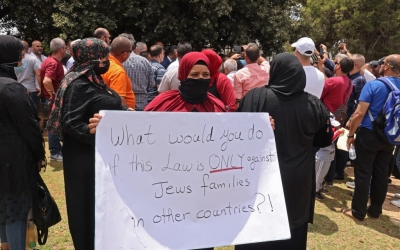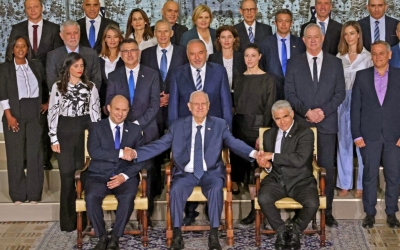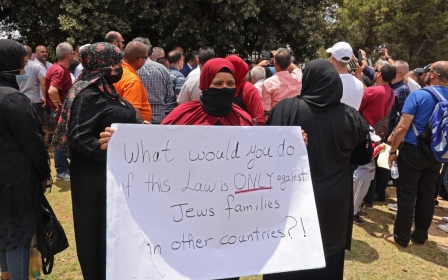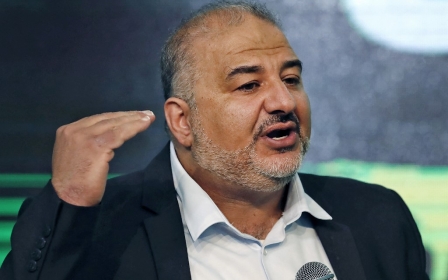Israel: New government dealt blow in controversial citizenship vote

Israel's new government faced its first big defeat in parliament on Tuesday, failing to renew a controversial law that prevents Palestinians living in the occupied West Bank and besieged Gaza Strip who marry Israeli citizens from living permanently in Israel with their spouses.
It was the first major political test for Prime Minister Naftali Bennett, who for nearly a month has been heading a narrow and diverse coalition that includes left-wing, centrist and Arab parties, along with his own ultranationalist party.
New MEE newsletter: Jerusalem Dispatch
Sign up to get the latest insights and analysis on Israel-Palestine, alongside Turkey Unpacked and other MEE newsletters
With the vote tied 59-59, Bennett failed to secure the simple majority needed to extend the so-called Citizenship and Entry Into Israel Law, underscoring his government's fragility.
Israel first passed the law in 2003, during the height of a Palestinian uprising, claiming Palestinians who married Israeli citizens used their legal status to help carry out attacks against Israel.
The law prevents Palestinian inhabitants of the West Bank and Gaza Strip from gaining residency or citizenship of Israel through marriage to another citizen. Exceptions are made on a case-by-case basis.
Critics derided it as a discriminatory measure and the ban has caused endless complications for Palestinians living across Israel and the territories it has illegally occupied since 1967.
A substantial number of those affected live in occupied East Jerusalem and therefore have Israeli residency, without necessarily being citizens of Israel. Israel annexed East Jerusalem in a move never recognised by the international community.
'Continuous prison'
According to human rights groups, the law bars almost 45,000 Palestinian families inside Israel and East Jerusalem from reuniting with their spouses and children.
The law has often been referred to as the "Racist Family Separation Law", with Palestinians and rights groups arguing it is designed to keep the number of Palestinians holding Israeli documents low.
In a protest against the measure outside parliament on Monday, some recounted the hardships of seeking permits to join their spouses, or the risks of entering Israeli territory without permission.
Ali Meteb told AFP that his wife not having Israeli residency rights had confined his family to a "continuous prison".
"I am asking for rights that the state owes us... for my wife to have Israeli ID, residency rights and freedom of movement," he said.
The law was initially enacted for one year but has been extended ever since on an annual basis, including by former Prime Minister Benjamin Netanyahu, who now leads the opposition.
Netanyahu refused to give him a lifeline and voted against it.
Bennett last month reached a power sharing deal with centrist Yair Lapid to unseat Netanyahu. Together they put together a coalition of parties with 61 of 120 seats in parliament.
Under the deal Lapid, now foreign minister, will take over as prime minister after two years.
However, the eight parties in the coalition were united by little but their shared enmity to Netanyahu, whom they unseated after a record 12 straight years in power.
Compromise offered
During the debate on the law's extension, Interior Minister Ayelet Shaked said a compromise had been approved by the cabinet, prompting a new round of debate by lawmakers that went on through the night.
If the Knesset had approved the compromise extension, it would have been extended by six months, rather than one year, and several hundred Palestinians married to Israelis and who have been living in Israel for a considerable time would have been offered non-citizen residency status.
Just ahead of voting, Bennett declared that the vote was also a vote of confidence in the government.
However, as there were some abstentions and not a majority of votes against the extension, the coalition survived the vote.
Amichai Chikli of Bennett's Yamina party voted against the legislation, while the United Arab List's Mansour Abbas and Walid Taha voted in favour of it.
Middle East Eye delivers independent and unrivalled coverage and analysis of the Middle East, North Africa and beyond. To learn more about republishing this content and the associated fees, please fill out this form. More about MEE can be found here.






